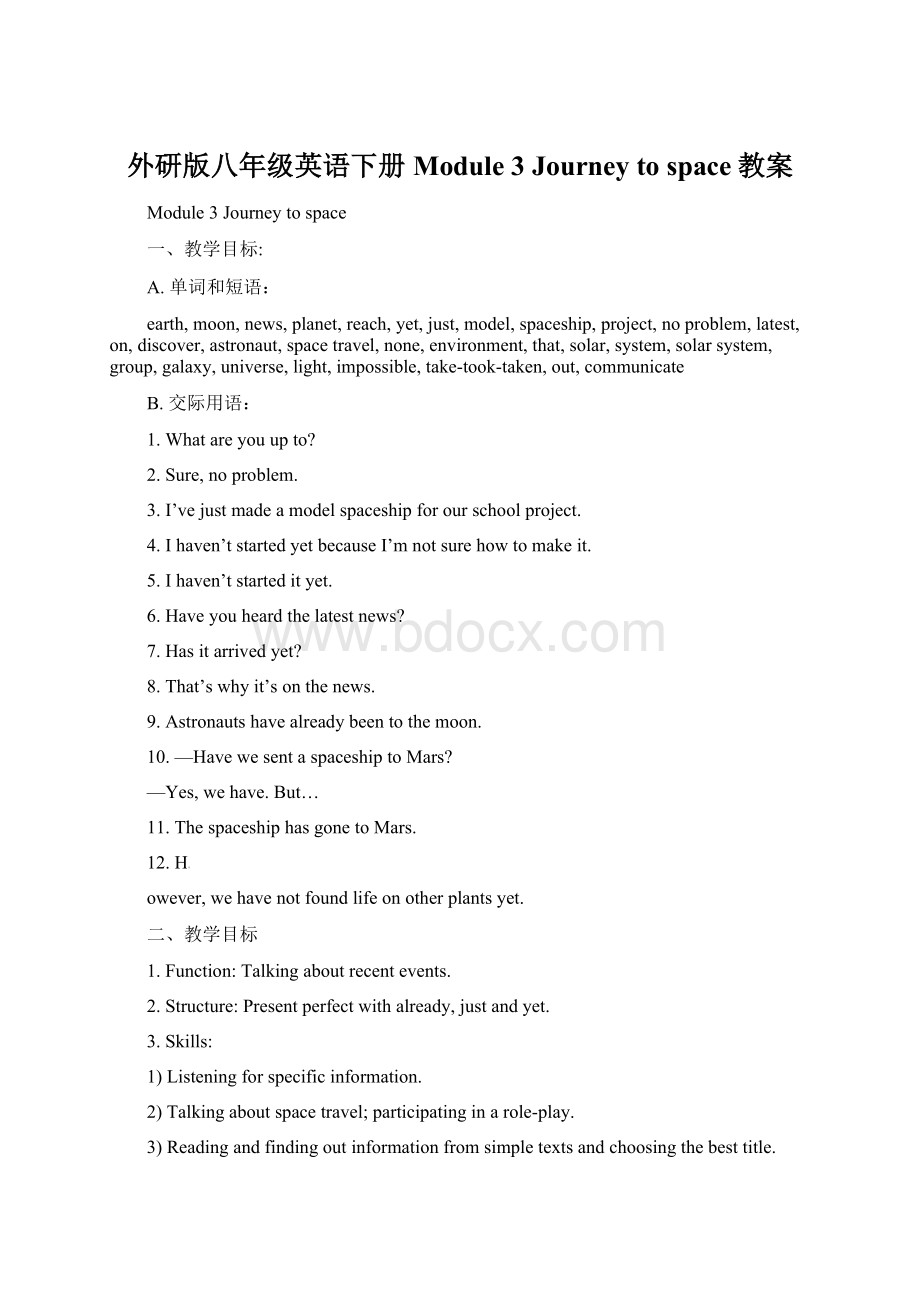外研版八年级英语下册Module 3 Journey to space教案.docx
《外研版八年级英语下册Module 3 Journey to space教案.docx》由会员分享,可在线阅读,更多相关《外研版八年级英语下册Module 3 Journey to space教案.docx(14页珍藏版)》请在冰豆网上搜索。

外研版八年级英语下册Module3Journeytospace教案
Module3Journeytospace
一、教学目标:
A.单词和短语:
earth,moon,news,planet,reach,yet,just,model,spaceship,project,noproblem,latest,on,discover,astronaut,spacetravel,none,environment,that,solar,system,solarsystem,group,galaxy,universe,light,impossible,take-took-taken,out,communicate
B.交际用语:
1.Whatareyouupto?
2.Sure,noproblem.
3.I’vejustmadeamodelspaceshipforourschoolproject.
4.Ihaven’tstartedyetbecauseI’mnotsurehowtomakeit.
5.Ihaven’tstartedityet.
6.Haveyouheardthelatestnews?
7.Hasitarrivedyet?
8.That’swhyit’sonthenews.
9.Astronautshavealreadybeentothemoon.
10.—HavewesentaspaceshiptoMars?
—Yes,wehave.But…
11.ThespaceshiphasgonetoMars.
12.H
owever,wehavenotfoundlifeonotherplantsyet.
二、教学目标
1.Function:
Talkingaboutrecentevents.
2.Structure:
Presentperfectwithalready,justandyet.
3.Skills:
1)Listeningforspecificinformation.
2)Talkingaboutspacetravel;participatinginarole-play.
3)Readingandfindingoutinformationfromsimpletextsandchoosingthebesttitle.
4)Writingapassagetodescribethepicture.
4.Aroundtheworld:
Namesofthedaysofthe
week.
5.Task:
Makingaposteraboutspacetravel.
三、重点及难点:
1.Structure:
Presentperfectwithalready,justandyet.
2.Tounderstandthedifferencebetweenhavebeentoandhavegoneto.
四、教学设计:
Unit1Hasitarrivedyet?
ⅠTeachingmodel
Listeningandspeaking
ⅡTeachingmethod
PWPapproach
ⅢTeachingaims
1.TounderstandPresentperfectwithalready,justandyet.
2.TounderstandtheconversationaboutthespacemissiontoMars.
3.Tounderstandthedifferencebetweenhavebeentoandhavegoneto.
ⅣTeachingObjectives
1.Keyvocabulary:
earth,moon,news,planet,reach,yet,just,model,spaceship,project,noproblem,latest,on,discover,astronaut,spacetravel
2.Keystructures:
Presentperfectwithalready,justandyet.
ⅤTeachingaids
Taperecorder,OHP,video
ⅥTeachingSteps
Step1Warmingup
1.Enjoynewsreportandwatchavideo.
2.Showsomepicturestointroducethenewwords.
3.Learnthenewwords.
4.Readthenewwords.
Step2Listenandnumberthewordsasyouhearthem.
1.AskthestudentstoreadthewordsinActivity1.
earth,land,message,moon,news,planet,reach,scientist
2.Playtherecording.
3.Listenandnumberthewordsasyouhearthem.
4.Askthestudentstochecktheiranswerwithapartner.
5.Callbacktheanswerfromthewholeclassandchecktheanswer.
Step3Listenagainandcompletethenotes.
1.AskthestudentstoreadthenotesinActivity2.
newsaboutthetripto
(1)____________
journeyof
(2)__________months
hasnotsentbackany(3)___________yet
hopetofind(4)____________onMars
2.Listenagainandcompletethenotes.
3.Askthestudentstochecktheiranswerwithapartner.
4.Callbacktheanswerfromthewholeclassandchecktheanswer.
keys:
Marseightmessageslife
St
ep4Listenandread.
1.Showsomepictures,andaskthestudentstotalkaboutthem.
2.Askthestudentstoreadtheconversationsilently.
3.Playtherecordingandaskthestudentstolistenandreadtheconversation.
4.Readtheconversation.
5.Actitout.
6.Learn“EverydayEnglish”
1)Whatareyouupto?
2)Sure,noproblem.
Step5Nowanswerthequestions.
1.AskthestudentstoreadthroughthequestionsinActivity3.
1)WhatschoolprojecthaveDamingandTonygot?
2)HowdoesDamingfeelabouttheschoolproject?
3)WhatnewshasTonyheard?
4)HasanyonebeentoMars?
Why?
2.AskthestudentstoreadthroughtheconversationinActivity3aga
in.
3.Answerthequestions.
4.Checkwithapartner.
5.Callbacktheanswersfromthewholeclass.
Keys:
Theyhavegotaprojectonspaceships.
He’snotsurehowtomakethemodel.
ThespaceshiptoMarshasreachedthere.
NoonehasbeentoMarsyet,becauseMarsisveryfaraway,muchfartherthanthemoon.
Step6Languagepoints.
1.Whatareyouupto?
你在做什么呢?
upto表示“正在干,从事着”。
常用在非正式常合中。
e.g.What’sheuptowithallthosebooksonthefloor?
Whatwereyouuptoyesterday?
Youdidn’tanswermyphone.
2.I’vejustmadethismodelofthespacestation.
这是我刚做的宇宙空间站的模型。
just常用在现在完成时的肯定句中,常放在助动词have/has的后面。
e.g.We’vejustseen/watchedthefilm.
3.Ihaven’tstartedityet.我还没有开始做呢。
yet表示“还(末)”,常用在现在完成时的否定句中,通常放在句末。
e.g.Wehaven’tfinishedourhomeworkyet.
4.Haveyouheardthelatestnews?
你听说过这个最新消息吗?
latestadj.最近的;最新的
e.g.Thenewsisallaboutthelatestmeeting.这条消息是关于最近的会议的。
5.That’swhyit’sonthenews.这就是它为什么出现在新闻报导的原因。
That’swhy…这就是为什么……
e.g.That’swhytheydidn’tlikethemusic.这就是为什么他们不喜欢这个音乐。
onprep.在(播放)中;关于……
e.g.What’sontheTV?
电视正在播放什么节目?
6.SohavetheydiscoveredlifeonMars?
所以他们在火星上发现生命了吗?
discoverv.发现;找到
e.g.Thefactisthathedidnotdiscoverit.事实是他没有发现它。
7.Astronautshavealreadybeentothemoon.宇航员已经去过月球了。
already表示“已经”,常放在have/has之后,通常用于肯定句中。
e.g.Jackhasalreadyfinishedhishomework.
have/hasbeento表示曾经去过某地,但现在已经回到他的生活所在地。
e.g.They’vealreadybeentoSuzhoutwice.他们已经去过苏州两次了。
语法小结:
just用来表示“刚刚”,already用来表示“已经”,一般置于have/has之后,两者都用于肯定句;yet用在否定句和疑问句,表示“还未”。
havebeento表示“去过某地”,但现在已经回来了;
havegoneto表示“去了某地”,现在不在这里(说话人所在地)
Step7Workinpairs.
1.Makelistsofwhatwehaveandhavenotdoneinspacetravel.
WehaveWehavenot…
__________________________________________________________
__________________________________________________________
__________________________________________________________
_______________
___________________________________________
___________________________________________________________
Key:
Wehave
Adoghastravelledinspace.
Menhavetravelledtothemoon.
SpaceshipshavetakenphotographsonMars.
Wehavenot
Wehavenotbuilthousesinspace.
AstronautshavenotbeentoMercury.
ScientistshavenotvisitedVenus.
2.TalkaboutspacetravelwiththelistsinActivity6.
—HavewesentaspaceshiptoMars?
—Yes,wehave.But…
3.Workinpairs.
Unit2Wehavenotfoundlifeonanyotherplanetsyet.
ⅠTeachingmodel
Readingandwriting.
ⅡTeachingmethod
Top-downapproach
ⅢTeachingaims
1.Listenforspecificinformation.
2.Talkaboutspacetravel;participatinginarole-play.
3.Readandfindoutinformationfromsimpletextsandchoosethebesttitle.
4.Writeapassagetodescribethepicture.
ⅣTeachingObjectives
Keyvocabulary:
none,environment,that,solar,system,solarsystem,group,galaxy,universe,light,impossible,take-took-taken,out,communicate
ⅤTeachingaids
Recorder,OHP,video
ⅥTeachingSteps
Step1Warming-up
1.ShowsomepicturestoreviewthetextofUnit1.
2.Showsomepictures.
3.Talkaboutthepictures.
4.Introducethenewwords.
5.Readthewordsaftertheteacher.
Step2Workinpairs.
1.EnjoyNewsReport.
2.ShowsomepicturestotalkaboutsomethingaboutShenzhou-9
3.AskthestudentstolookatthepictureinActivity1.
4.Workinpairs.
Shenzhou-9isamannedspaceship.
Step3Reading
1.Playtherecordingandlistentothetapecarefully.
2.Askthestudentstoreadthroughthepassage.
3.Choosethebesttitleforit.
1)Anyoneoutthere?
2)Lifeontheearth
3)Thesunan
dotherstars
4)Thestarsatnight
4.Checkwithapartner.
5.Callbacktheanswersfromthewholeclass.
6.Readthetexttogether.
Step4Languagepoints
1.ScientiststhinkthattherehasbeenlifeonEarthforhundredsofmillionsofyears.
科学家认为地球上的生命已经有亿万年了。
millionsof数百万,hundredsof数百,thousandsof成千上万,billionsof数十亿
e.g.TherearebillionsofstarsintheGalaxy,andoursunisonlyoneofthem.
银河系中有数十亿颗恒星,我们的太阳只是其中的一个。
2.However,wehavenotfoundlifeonanyotherplanetsyet.
然而,我们还没有在任何其他行星上发现生命。
yet用于否定句和疑问句,意思是“还,尚”。
not…yet的意思是“还没,尚未”,表示某事物在某一时间尚未发生,但未来也许会发生。
例如:
Ihaven’tlearntanyfartherinformationyet.我还没有得到进一步的信息。
Haveyoureceivedherletteryet?
你收到她的来信了吗?
3.TheEarthisaplanetanditgoesaroundtheSun.Sevenotherplanetsalsogoaroundthesun.地球是颗行星,它围绕着太阳转。
还有其他七颗行星也围绕着太阳转。
太阳系的其他七颗行星:
水星(Mercury)、金星(Venus)、火星(Mars)、木星(Jupiter)、土星(Saturn)、天王星(Uranus)、海王星(Neptune)。
4.Noneofthemhasanenvironmentlikethatoftheearth,soscientistsdonotthinktheywillfindlifeonthem.
他们中没有一个有像地球这样的环境,因此科学家认为在他们上面找不到生命。
noneof…表示(三个以上)一个也没有。
做主语时,谓语动词可用单数或复数。
如:
Noneofushas/havebeentotheMars.我们中没一个去过火星。
5.…oursolarsystemisasmallpartofamuchlargergroupofstarsandplanets,calledtheGalaxyortheMilkyWay.
我们的太阳系只是一个由恒星和行星组成的星系的一小部分,这个星系比太阳系大得多,称作银河系或银河。
这里的theGalaxy专指“银河系”,也可以称作theMilkyWay。
而galaxy则泛指“星系”。
例如:
Scientistshavedisc
overedadistantgalaxy.科学家们发现了一个遥远的星系。
6.Sohowlargeistheuniverse?
It’simpossibletoimagine.
所以宇宙有多大?
我们无从想象。
句型:
Itis+形容词+to+动词原形,意思是“做某事很……”
Itisdifficulttoreadthesewords.读这些单词很难。
7.Withsomanystarsintheuniverse,arewealone,oristherelifeoutthere
inspace?
宇宙中有这么多恒星,我们是孤独的吗?
抑或太空中还有其他生命存在
呢?
with+名词+介词短语,表示伴随情况,意思是“带着……”。
例如:
Mr.Zhangiscomingwithabookinhishands.
张老师手里带着一书进来了。
alone在句中作形容词,不作定语只做表语,也可作副词。
意思是“独自地”。
例如:
Shewasaloneinthatdarkroom.她独自一人呆在那黑屋子里。
Step5Lookandanswerthequestions.
1.LookatthepicturefromasciencestoryforchildreninActivity5.
2.Readthroughtheexamplesentences
Whathavethescientistsjustreceived?
(amessagefromoneofourspaceships)
Theyhavejustreceivedamessagefromoneofourspaceships.
3.Askthestudentstoanswerthequestions.
1)Wherehasthespaceshiplanded?
(Mars)
2)Whathasthespaceshipdiscovered?
(peopleonMars)
3)WhyhavethepeopleonMarsnotsentusamessage?
(donotknowhowto)
4)WhyhavethepeopleonMarsnotvisitedu